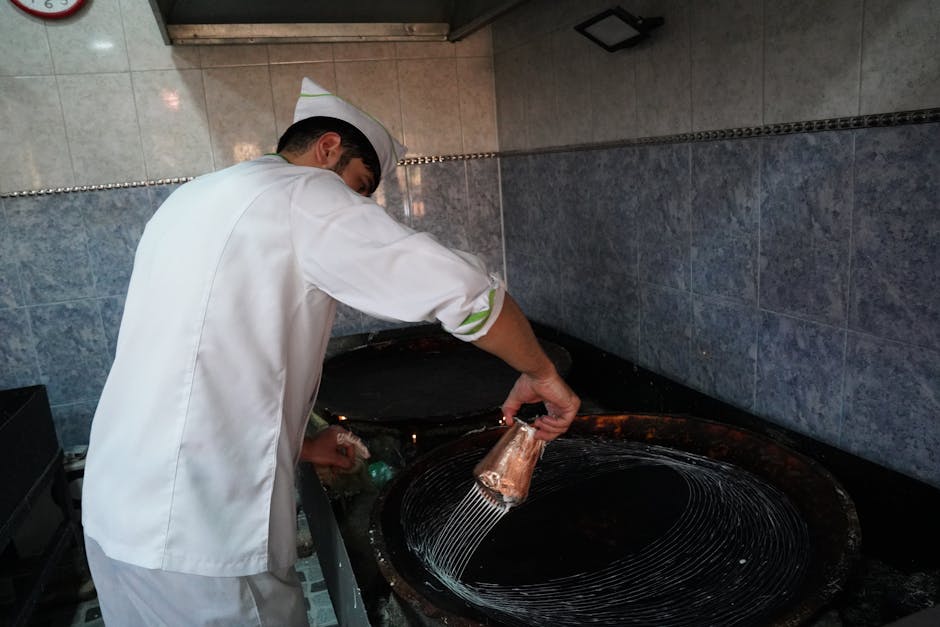The food service industry is no stranger to the challenges of recruiting and hiring talented individuals. In the constantly evolving business landscape of 2023, food service recruiters face an even greater set of obstacles. From the ongoing labor shortage to changing consumer demands, finding and retaining qualified employees has become increasingly difficult. However, understanding and addressing these challenges head-on is crucial for businesses seeking to remain competitive and maintain their professional brand in such a dynamic industry. In this blog post, we will delve into some of the key hiring challenges faced by food service industry recruiters in 2023 and explore potential strategies to overcome these obstacles. Let's explore how recruiters are navigating a complex landscape of talent acquisition in an industry that never stops moving.
Discuss the importance of recruitment in the food service industry

The food service industry is a crucial sector that heavily relies on its workforce to deliver high-quality products and services. In 2023, the industry faces numerous hiring challenges that recruiters must tackle to ensure the smooth functioning of businesses.
Recruitment holds immense importance in the food service industry due to several reasons. Firstly, a skilled and dedicated workforce is vital for maintaining a consistent level of service. From fast-food chains to fine dining restaurants, the quality of customer experience largely depends on the competence and efficiency of the employees. A well-structured recruitment process helps identify individuals with the necessary skills, experience, and commitment to excel in this demanding industry.
Moreover, the food service industry is known for its fast-paced and dynamic nature. Recruiters must consider this aspect while bringing new talent on board. Hiring individuals who can adapt quickly, think on their feet, and handle pressure effectively becomes imperative. Through an effective recruitment strategy, recruiters can screen candidates thoroughly, ensuring that only those capable of thriving in this fast-paced environment are selected.
Another aspect that highlights the significance of recruitment in the food service industry is the emphasis on professional image and brand reputation. Many businesses within this industry aim to maintain a professional atmosphere and brand that gives customers a sense of reliability and trust. Recruiters play a vital role in hiring individuals who align with the company's values and can uphold its professional image.
Additionally, the food service industry often experiences high turnover rates due to various factors such as a seasonal workforce, part-time employment, and career mobility. Recruiters need to constantly be on their toes to attract and retain talented individuals who can contribute to the long-term success of the business. Implementing comprehensive recruitment strategies can assist in identifying and engaging with potential candidates, ensuring a steady stream of talent even when faced with turnover challenges.
Highlight the significant challenges faced by recruiters in 2023

The food service industry is known for its fast-paced environment and high turnover rates, which often pose significant challenges for recruiters seeking to find and retain top talent. As we delve into 2023, recruiters are facing a whole new set of hurdles that require innovative solutions. In this section, we will highlight some of the most critical challenges encountered by recruiters in the food service industry this year.
1. Shortage of Skilled Labor: A major challenge faced by recruiters in 2023 is the shortage of skilled labor in the food service industry. The pandemic has resulted in many skilled workers leaving the industry, pursuing different career paths, or even retiring early. This shortage creates a highly competitive landscape, where recruiters are in constant competition to attract and retain the best candidates.
2. Evolving Skillset Requirements: The food service industry is undergoing rapid technological advancements, driving the need for new skillsets amongst employees. Recruiters face the challenge of finding candidates who possess both traditional hospitality skills and technological proficiency. From using digital ordering systems to operating automated kitchen equipment, recruiters are seeking candidates who can adapt to these changes and thrive in a tech-driven industry.
3. Increasing Employee Expectations: Another challenge faced by recruiters is the increasing expectations of job seekers in terms of work-life balance, compensation, and career development opportunities. As the job market becomes more employee-centric, recruiters need to carefully consider their employer branding and company culture to attract and retain top talent. Overcoming this challenge requires offering competitive benefits packages, implementing wellness programs, and providing clear career progression paths.
4. Intensifying Recruitment Competition: With the food service industry's ongoing growth, the competition among recruiters is fiercer than ever. As more establishments open and expand, recruiters must maintain a strong network, build robust talent pipelines, and deploy effective recruitment strategies. Staying ahead requires thinking outside the box and leveraging technology to streamline processes and engage with potential candidates faster and more efficiently.
5. Retaining Quality Hires: In a business with high turnover rates, recruiters face the ongoing challenge of retaining quality hires. It's essential to recognize that finding the right fit goes beyond skills and experience. Recruiters must ensure proper onboarding, offer ongoing training and development programs, foster a positive work environment, and provide opportunities for advancement. Employee engagement and retention strategies are crucial for reducing turnover and retaining valuable talent.
Labor shortages will grow in 2024

The food service industry has been grappling with a significant labor shortage in recent years, and this challenge has only intensified in 2023. Recruiters in this sector are finding it increasingly difficult to attract and retain qualified candidates for various positions within the industry.
One of the primary factors contributing to the labor shortage is the changing workforce dynamics. With the rise of the gig economy and a shift towards remote work in other industries, the food service industry is struggling to compete for talent. Many potential employees are opting for more flexible schedules and better work-life balance, making it harder for recruiters to fill key roles within their organizations.
Another issue faced by food service recruiters is the lack of skilled workers. The industry requires individuals with specialized skills, such as culinary expertise or front-of-house management experience. However, there is a limited pool of qualified candidates available, making it challenging for recruiters to find the right fit for their organizations. This shortage of skilled workers has not only contributed to unfilled positions but has also led to increased competition among businesses to attract and retain talent.
Furthermore, the low wages typically associated with entry-level food service positions are another obstacle recruiters face. Many potential candidates may be dissuaded by the comparatively low pay offered by the industry, leading them to explore opportunities in other sectors. To address this issue, food service businesses may need to reconsider their compensation structures and explore offering competitive wages, benefits, or incentives to entice qualified individuals to join their teams.
The evolving landscape of technology and automation within the food service industry is also impacting the hiring process. As businesses integrate more tech-driven solutions and automated systems, the demand for employees with digital skills and the ability to adapt to new technologies has increased. Unfortunately, there is a shortage of individuals with these skills, further complicating the recruitment process for food service industry recruiters.
To tackle the labor shortage, food service recruiters must adopt innovative strategies. This may involve implementing comprehensive training programs to upskill existing employees, fostering partnerships with educational institutions to attract fresh talent, and leveraging social media platforms to reach a broader audience of potential candidates. By thinking outside the box and being proactive in overcoming these challenges, recruiters in the food service industry can navigate the labor shortage and build resilient teams that can drive success in 2023 and beyond.
Elaborate on the ongoing labor shortage in the food service industry

The food service industry is currently facing significant challenges when it comes to hiring new employees. Across the country, restaurants, cafes, and other food establishments are struggling to find qualified and skilled individuals to join their teams. This ongoing labor shortage is creating hurdles for recruiters in the industry.
One of the major contributing factors to this labor shortage is the evolving job market. As the economy continues to rebound and more industries offer remote work opportunities, potential candidates are exploring alternative career paths. The allure of flexible working hours and the opportunity to work from home has led to a decrease in the number of individuals interested in traditional food service roles.
Another factor complicating the hiring process is the increasing competition among food service establishments. With the rise of online delivery services, food delivery apps, and ghost kitchens, the demand for skilled workers has grown exponentially. Restaurants are not only competing with each other for talent but also with these new emerging sectors within the industry.
Moreover, the ongoing pandemic has had a substantial impact on the labor pool for food service recruiters. During the height of the pandemic, many individuals were laid off or furloughed due to the closure of restaurants and restricted dining options. This uncertainty caused many individuals to seek employment in other industries, leaving a gap in the food service talent pool.
Additionally, the food service industry has a reputation for long hours, physically demanding work, and sometimes even a lack of benefits or job security. These factors can deter potential applicants from pursuing careers in the industry, further deepening the hiring challenges faced by recruiters.
To overcome these challenges, food service recruiters are now focusing on adaptive hiring strategies. They are investing in innovative recruitment methodologies, such as partnering with culinary schools, offering attractive incentives, flexible scheduling, and enhancing employee benefits to entice new talent. They are also leveraging technology to streamline the hiring process, using online platforms for job postings, video interviews, and virtual job fairs.
Factors contributing to this shortage, such as fewer applicants and high turnover rates

The food service industry is currently experiencing significant challenges when it comes to hiring and recruitment. Recruiters in this industry are facing numerous obstacles which contribute to a shortage of qualified applicants and high turnover rates. Several factors are responsible for these challenges.
One major contributing factor is the dwindling number of applicants. In recent years, there has been a decline in the number of individuals interested in pursuing careers in the food service industry. Many individuals are choosing to pursue different career paths, which has resulted in a smaller pool of applicants for recruiters to choose from. This shortage of applicants makes it difficult for recruiters to find suitable candidates to fill vacant positions within their organizations.
Another factor adding to the hiring challenges is the high turnover rates within the food service industry. The demanding nature of the work, coupled with long working hours and low wages, often leads to dissatisfaction among employees. Many individuals working in the food service industry find it challenging to strike a work-life balance and are often lured away by other job opportunities that offer better working conditions and higher pay. This constant turnover creates a recurring problem for recruiters who have to constantly search for new hires to replace those who have left.
Furthermore, the COVID-19 pandemic has also significantly impacted the hiring process in the food service industry. Many restaurants and food establishments were forced to shut down or operate with limited capacity due to restrictions and safety concerns. This resulted in massive layoffs, leaving recruiters with a surplus of applicants and a lack of available positions. As the industry slowly recovers, recruiters face the challenge of attracting and retaining talent, as individuals may be hesitant to return to a field that was severely impacted by the pandemic.
Difficulties Attracting qualified candidates

In today's competitive job market, attracting qualified candidates has become a significant challenge for recruiters in the food service industry. As the industry continues to grow and evolve, it is crucial for recruiters to develop innovative strategies to attract top talent. Here are some effective techniques that can help food service recruiters overcome these hiring challenges and attract qualified candidates in 2023.
1. Develop an enticing employer brand: A strong employer brand is essential in attracting high-caliber candidates. Showcase your company's values, mission, and the opportunities it provides for professional growth. Highlight any unique perks or benefits that set you apart from your competitors. By creating a positive and engaging brand image, you can attract individuals who align with your company culture and are genuinely interested in contributing their skills to your organization.
2. Optimize the job description: A well-crafted job description is crucial for attracting qualified candidates. Use clear language and concise bullet points to outline the specific requirements and responsibilities of the role. Highlight career growth opportunities, any training programs, or ongoing learning opportunities available to employees. Make sure to clearly define the skills and experience you are looking for, as this will attract candidates who possess the necessary qualifications.
3. Leverage social media and online platforms: In an increasingly digital world, social media and online job platforms are excellent tools for attracting qualified candidates. Utilize platforms like LinkedIn, Facebook, Twitter, and Instagram to actively promote your job openings. Engage with potential candidates by sharing industry-related content, company updates, and testimonials from satisfied employees. Leveraging these platforms will help you create a strong online presence and attract candidates who are active in the digital space.
4. Participate in industry events and job fairs: Attend job fairs and industry-specific events to connect with potential candidates face-to-face. This allows you to personally engage with individuals who share an interest in the food service industry and showcase what sets your company apart. Take the opportunity to highlight your company culture, values, and career advancement opportunities, all of which can help attract qualified candidates seeking a long-term commitment.
5. Offer competitive compensation packages: In a competitive job market, offering an attractive compensation package can significantly impact your ability to attract qualified candidates. Conduct regular market research to ensure that your compensation rates are competitive within the industry. Consider additional incentives such as healthcare benefits, paid time off, flexible work hours, or performance bonuses. Offering a comprehensive compensation package sends a message that your company values its employees and their contributions.
6. Create a positive candidate experience: A positive candidate experience during the recruitment process is crucial for attracting qualified candidates. Provide timely and transparent communication throughout the hiring process, keeping candidates informed of their progress. Consider implementing pre-employment assessments or skill tests to evaluate candidates objectively. Providing feedback, whether it's positive or constructive, helps candidates feel valued and engaged with your organization.
Difficulty of attracting qualified candidates due to competition from other industries

In today's competitive job market, the food service industry is grappling with a unique challenge - the difficulty of attracting qualified candidates due to intense competition from other industries. As the economy thrives and employment opportunities expand, recruiters in the food service sector are finding it increasingly challenging to attract top talent to their organizations.
One of the primary reasons for this hiring struggle is the perception of the food service industry as a transient or entry-level job sector. Many job seekers, particularly those with higher education or specialized skills, tend to overlook opportunities within the food service industry in favor of more traditionally "professional" or prestigious fields. This perception gap can be attributed to various factors, including societal perceptions, lack of industry exposure, and limited information about the wide range of career opportunities within the food service sector.
To address this challenge, recruiters must actively work to dispel the misconception that the food service industry lacks growth prospects or career advancement opportunities. Highlighting success stories of individuals who have climbed the ladder within the industry can serve as compelling testimonials. Sharing the diverse career paths available, such as managerial roles, executive chef positions, and entrepreneurial opportunities, can help present the food service industry as a viable long-term career option.
Another effective approach to attract qualified candidates is by emphasizing the unique benefits and perks offered within the food service industry. Recruiters should highlight various advantages such as flexibility in work schedules, the potential for rapid career growth, and the chance to work in a dynamic and creative environment. By showcasing the positive aspects of working in the food service industry, recruiters can pique the interest of potential candidates and entice them to consider career opportunities within this field.
Furthermore, collaborating with culinary schools, hospitality management programs, and other relevant educational institutions can help bridge the gap between job seekers and the food service industry. Establishing partnerships to offer internships, apprenticeships, or training programs can expose students to the vast range of opportunities available within the food service sector. This exposure can help shift their perceptions and encourage them to consider pursuing careers in the industry.
Strategies recruiters can employ to make job offers more appealing

To overcome the hiring challenges faced by recruiters in the food service industry, it is crucial to implement strategies that make job offers more appealing to potential candidates. Here are some effective strategies recruiters can employ:
1. Competitive Compensation Packages: Offering a competitive salary and benefits package is essential to attract talented individuals. Recruiters should conduct thorough research on industry standards and ensure that their offers are in line with or even exceed what competitors are providing. Additionally, offering incentives such as performance bonuses or profit-sharing can make the job offer more enticing.
2. Flexible Work Schedule: In today's fast-paced world, many job seekers value flexibility in their work schedule. By allowing for flexible shifts or opportunities to work remotely, recruiters can appeal to candidates seeking a better work-life balance. Flexibility can also be an attractive factor for individuals with other commitments, such as students or those with family responsibilities.
3. Clear Career Development Paths: A clear career progression plan is crucial to attract ambitious individuals. Recruiters should highlight opportunities for growth and advancement within the company. This can include mentorship programs, training opportunities, and the potential for promotions or cross-functional roles. Providing a sense of career stability and growth potential can be a highly appealing factor for job seekers.
4. Employee Recognition and Rewards: Creating a positive and supportive work culture is crucial for attracting top talent. Recruiters should highlight any employee recognition programs or rewards that are in place. This could include employee of the month awards, performance-based bonuses, or even company-wide events to celebrate milestones or achievements. A culture that values and recognizes hard work can greatly increase the appeal of a job offer.
5. Emphasize Work Environment and Company Culture: The food service industry is known for its fast-paced and dynamic work environments. Recruiters should highlight the positive aspects of the work environment, such as teamwork, camaraderie, and a sense of purpose. Sharing testimonials or success stories from current employees can help showcase the company's positive culture and attract like-minded individuals.
6. Showcase Employee Benefits: In addition to competitive compensation, recruiters should highlight the range of employee benefits available. This could include health insurance, retirement plans, paid time off, employee discounts, or other perks that might be unique to the company. By demonstrating a comprehensive benefits package, recruiters can make their job offers more appealing and stand out from competitors.
By implementing these strategies, recruiters in the food service industry can overcome hiring challenges and attract top talent. Creating appealing job offers not only helps in filling vacancies faster but also contributes to building a strong and talented workforce that will drive the success of the business.








